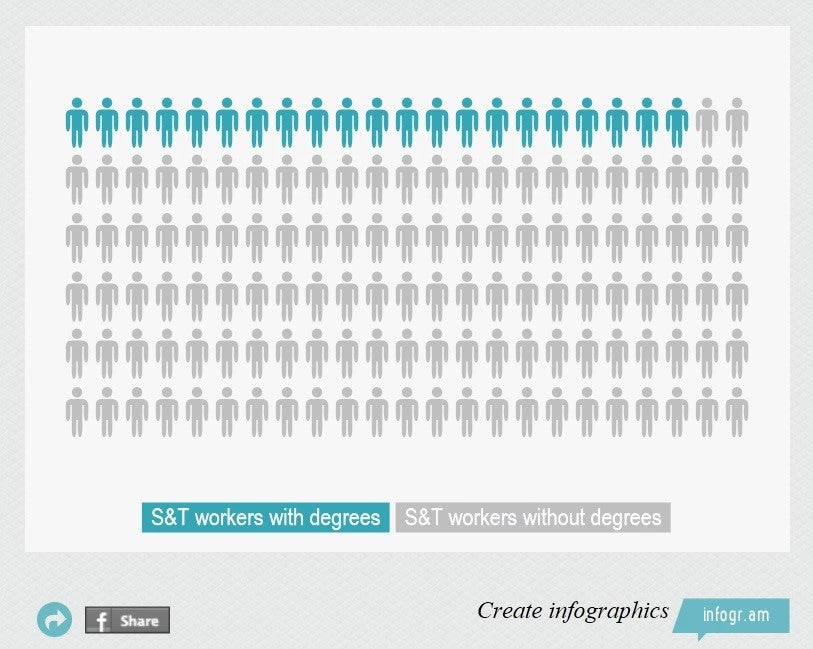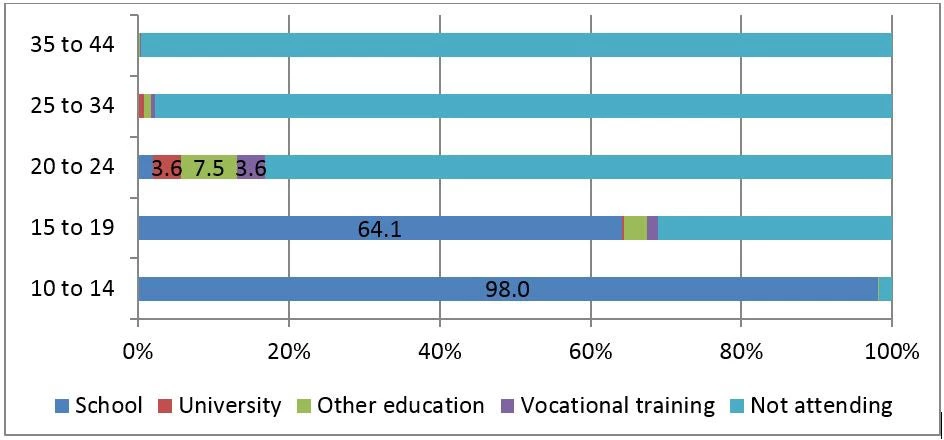With innovation taking a central role in driving markets, countries are increasingly looking to invest in innovation and technological change to be competitive and improve productivity. Innovation is driven by talent and creativity. But the demand for highly skilled workers, especially workers in the science and technology fields are increasing globally.
Sri Lanka too is aspiring to join the bandwagon of innovation. The Mahinda Chinthana – Vision for New Sri Lanka announced in 2010 - gives emphasis to knowledge-based economic activities, which require skilled workers. Skilled workers are needed not only to develop new technologies; they are also needed to identify uses for existing technologies and to make use of them in work places. The stock of qualified skilled workers in the country is limited. Many workers who carry out the work of skilled workers are not formally qualified for the jobs that they perform. A recent IPS study shows that only 15% of individuals working in specialized science and technology field jobs have a degree (see figure 1).

Source: IPS calculations based on Labor Force Survey data 2009
Increasing the stock of skilled workers in the country is challenging for several reasons. First Sri Lanka’s workforce is ageing. In 1990 only 35% of workers were aged 40 or above, but by 2012 this proportion has increased to 52%. This has serious implications for the long-established pattern of schooling, training and work. Even today, most training programs in the country are geared towards school leavers and the young. Only a handful of training opportunities are available for mature workers. With fewer young workers entering the labor force and the older workers receiving limited formal training the stock of skilled workers are not expanding.
Second, high-end training opportunities are limited in the country. Only a very small proportion of the young people who leave school enter university (see figure 2). A similar small proportion of individuals receive vocational training. Only 17% of youth in the 20 to 24 age group are participating in education. This proportion drops to less than 3% for 25 to 34 year olds and to less than 1% for 35 to 44 year olds.
Third, insufficient numbers of high school graduates have a background in science and technology related subjects so that they can enter science and technology-related training programmes. Labor shortages in certain industries have driven the government to expand training opportunities in some sectors. But the demand for such training programmes is limited, as many do not have the basic general education pre-requisites. Part of the problem is in the lack of science-educated high school graduates. This again stems from several shortcomings in the system because access to science education is limited in the country. Also the low quality of education at junior schools prevents children from obtaining the necessary grades in mathematics and science at younger ages to qualify for science education at higher grades.
Figure 2: Education participation by age group

Source: Own calculations based on Labor Force Survey 2009
Fourth, many qualified science and technology workers emigrate. This is partly due to aggressive recruitment campaigns carried out by developed countries to attract them. Many young who temporarily migrate to foreign countries to study, end up migrating permanently. Poor salaries for skilled workers and lack of challenging job opportunities are main push factor for emigration for skilled workers. Many aspiring parents also opt to live abroad to give better access to good quality schools and universities for their children.
If Sri Lanka is serious about moving towards a knowledge-based economy several things need to happen simultaneously. Quality of education needs to improve from kindergarten to post-graduate level. For if attention is only given to the university sector, there will not be sufficient numbers of qualified youth for the universities. The education sector needs to give special attention for promoting science education and harnessing creativity. Last of all, investments that create more lucrative employment opportunities need to be promoted to keep talented workers in the country.
Nisha Arunatilake is a Research Fellow and Head of Labour, Employment and Human Resources Development research at the Institute of Policy Studies of Sri Lanka.
Sri Lanka too is aspiring to join the bandwagon of innovation. The Mahinda Chinthana – Vision for New Sri Lanka announced in 2010 - gives emphasis to knowledge-based economic activities, which require skilled workers. Skilled workers are needed not only to develop new technologies; they are also needed to identify uses for existing technologies and to make use of them in work places. The stock of qualified skilled workers in the country is limited. Many workers who carry out the work of skilled workers are not formally qualified for the jobs that they perform. A recent IPS study shows that only 15% of individuals working in specialized science and technology field jobs have a degree (see figure 1).

Source: IPS calculations based on Labor Force Survey data 2009
Increasing the stock of skilled workers in the country is challenging for several reasons. First Sri Lanka’s workforce is ageing. In 1990 only 35% of workers were aged 40 or above, but by 2012 this proportion has increased to 52%. This has serious implications for the long-established pattern of schooling, training and work. Even today, most training programs in the country are geared towards school leavers and the young. Only a handful of training opportunities are available for mature workers. With fewer young workers entering the labor force and the older workers receiving limited formal training the stock of skilled workers are not expanding.
Second, high-end training opportunities are limited in the country. Only a very small proportion of the young people who leave school enter university (see figure 2). A similar small proportion of individuals receive vocational training. Only 17% of youth in the 20 to 24 age group are participating in education. This proportion drops to less than 3% for 25 to 34 year olds and to less than 1% for 35 to 44 year olds.
Third, insufficient numbers of high school graduates have a background in science and technology related subjects so that they can enter science and technology-related training programmes. Labor shortages in certain industries have driven the government to expand training opportunities in some sectors. But the demand for such training programmes is limited, as many do not have the basic general education pre-requisites. Part of the problem is in the lack of science-educated high school graduates. This again stems from several shortcomings in the system because access to science education is limited in the country. Also the low quality of education at junior schools prevents children from obtaining the necessary grades in mathematics and science at younger ages to qualify for science education at higher grades.
Figure 2: Education participation by age group

Source: Own calculations based on Labor Force Survey 2009
Fourth, many qualified science and technology workers emigrate. This is partly due to aggressive recruitment campaigns carried out by developed countries to attract them. Many young who temporarily migrate to foreign countries to study, end up migrating permanently. Poor salaries for skilled workers and lack of challenging job opportunities are main push factor for emigration for skilled workers. Many aspiring parents also opt to live abroad to give better access to good quality schools and universities for their children.
If Sri Lanka is serious about moving towards a knowledge-based economy several things need to happen simultaneously. Quality of education needs to improve from kindergarten to post-graduate level. For if attention is only given to the university sector, there will not be sufficient numbers of qualified youth for the universities. The education sector needs to give special attention for promoting science education and harnessing creativity. Last of all, investments that create more lucrative employment opportunities need to be promoted to keep talented workers in the country.
Nisha Arunatilake is a Research Fellow and Head of Labour, Employment and Human Resources Development research at the Institute of Policy Studies of Sri Lanka.


Join the Conversation